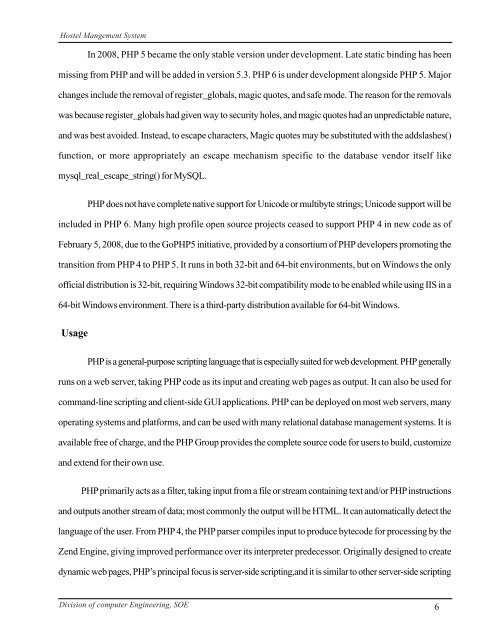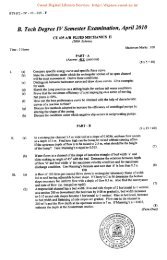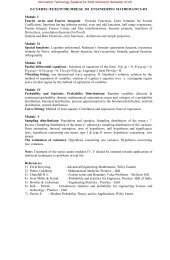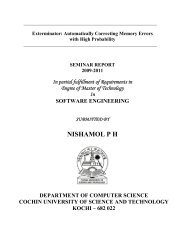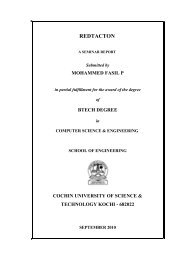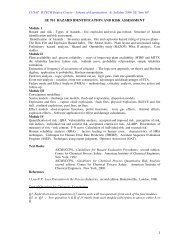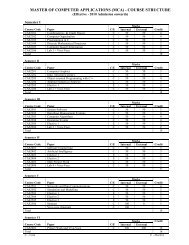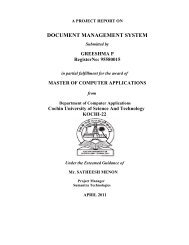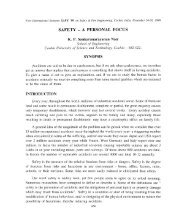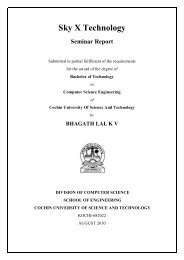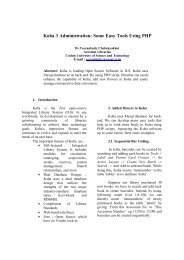hostel management system - DSpace at CUSAT - Cochin University ...
hostel management system - DSpace at CUSAT - Cochin University ...
hostel management system - DSpace at CUSAT - Cochin University ...
Create successful ePaper yourself
Turn your PDF publications into a flip-book with our unique Google optimized e-Paper software.
Hostel Mangement System<br />
In 2008, PHP 5 became the only stable version under development. L<strong>at</strong>e st<strong>at</strong>ic binding has been<br />
missing from PHP and will be added in version 5.3. PHP 6 is under development alongside PHP 5. Major<br />
changes include the removal of register_globals, magic quotes, and safe mode. The reason for the removals<br />
was because register_globals had given way to security holes, and magic quotes had an unpredictable n<strong>at</strong>ure,<br />
and was best avoided. Instead, to escape characters, Magic quotes may be substituted with the addslashes()<br />
function, or more appropri<strong>at</strong>ely an escape mechanism specific to the d<strong>at</strong>abase vendor itself like<br />
mysql_real_escape_string() for MySQL.<br />
PHP does not have complete n<strong>at</strong>ive support for Unicode or multibyte strings; Unicode support will be<br />
included in PHP 6. Many high profile open source projects ceased to support PHP 4 in new code as of<br />
February 5, 2008, due to the GoPHP5 initi<strong>at</strong>ive, provided by a consortium of PHP developers promoting the<br />
transition from PHP 4 to PHP 5. It runs in both 32-bit and 64-bit environments, but on Windows the only<br />
official distribution is 32-bit, requiring Windows 32-bit comp<strong>at</strong>ibility mode to be enabled while using IIS in a<br />
64-bit Windows environment. There is a third-party distribution available for 64-bit Windows.<br />
Usage<br />
PHP is a general-purpose scripting language th<strong>at</strong> is especially suited for web development. PHP generally<br />
runs on a web server, taking PHP code as its input and cre<strong>at</strong>ing web pages as output. It can also be used for<br />
command-line scripting and client-side GUI applic<strong>at</strong>ions. PHP can be deployed on most web servers, many<br />
oper<strong>at</strong>ing <strong>system</strong>s and pl<strong>at</strong>forms, and can be used with many rel<strong>at</strong>ional d<strong>at</strong>abase <strong>management</strong> <strong>system</strong>s. It is<br />
available free of charge, and the PHP Group provides the complete source code for users to build, customize<br />
and extend for their own use.<br />
PHP primarily acts as a filter, taking input from a file or stream containing text and/or PHP instructions<br />
and outputs another stream of d<strong>at</strong>a; most commonly the output will be HTML. It can autom<strong>at</strong>ically detect the<br />
language of the user. From PHP 4, the PHP parser compiles input to produce bytecode for processing by the<br />
Zend Engine, giving improved performance over its interpreter predecessor. Originally designed to cre<strong>at</strong>e<br />
dynamic web pages, PHP’s principal focus is server-side scripting,and it is similar to other server-side scripting<br />
Division of computer Engineering, SOE 6


